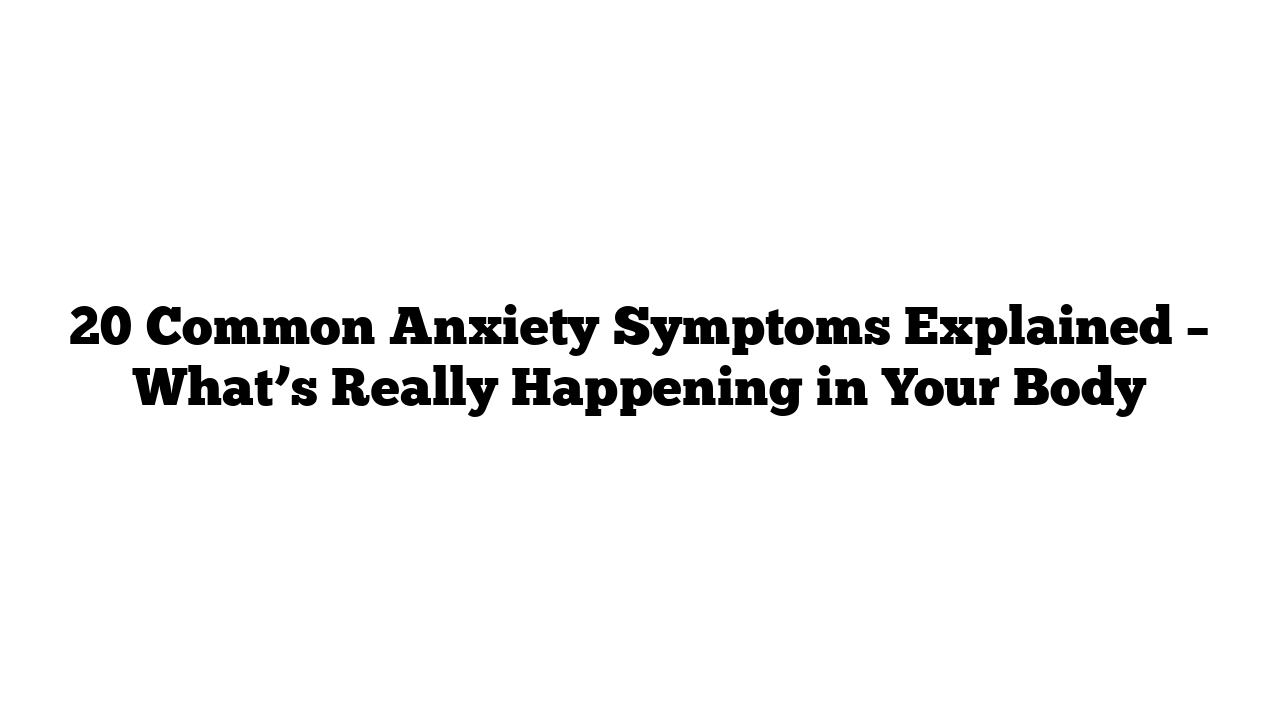Anxiety can be a challenging condition, impacting both your mind and body. The symptoms can vary, and often, people find themselves wondering if something more serious is at play. The good news is, understanding these symptoms is the first step in managing anxiety and reducing its grip on your daily life.
In this article, we’ll walk through 20 common (and sometimes uncommon) anxiety symptoms, and explain what’s causing them. By the end, you’ll have a better idea of how your body responds to anxiety, and what you can do to feel better.
1. Headaches
Tension in the suboccipital muscles (at the base of the skull) can lead to anxiety headaches. These headaches often feel like a tight band around your head, and they’re commonly caused by the physical tension that comes with anxiety. For more insight into how anxiety triggers headaches, feel free to check out my article on anxiety and headaches.
2. Rapid Heartbeat
When you’re anxious, your body goes into fight or flight mode, which releases adrenaline. This can lead to a faster heart rate (tachycardia), making you feel like your heart is racing. Although it can be scary, this is a normal response.
3. Shortness of Breath
Anxiety often causes shallow breathing or even the feeling of being unable to take a deep breath. This can lead to shortness of breath, which is part of the body’s natural response to stress, but it can be uncomfortable.
4. Dizziness or Lightheadedness
When your body is stressed, you may experience dizziness or a feeling of being off-balance. This is linked to changes in blood circulation as your body prepares for a potential threat, and while it’s unsettling, it’s usually not dangerous.
5. Fatigue
Even though anxiety can make you feel mentally alert, the constant state of worry can be draining. Fatigue sets in as your body is in a heightened state of stress for long periods, leading to exhaustion.
6. Muscle Tension
Constant anxiety often leads to muscle tension, especially in the shoulders, neck, and back. This can cause discomfort and even muscle spasms, as your body subconsciously prepares for a fight-or-flight response.
7. Sweating
Sweating is another physical reaction to anxiety. As your body activates its sympathetic nervous system, sweat glands are triggered, often leading to excessive sweating, especially on your palms and face.
8. Nausea or Stomach Issues
Many people experience digestive distress, like nausea, stomach cramps, or even diarrhea when they’re anxious. This is because anxiety affects the gut-brain connection, disrupting normal digestion.
9. Tingling or Numbness
Anxiety can cause tingling or numbness, particularly in the hands and feet. This sensation is linked to hyperventilation, which can occur when anxiety affects your breathing patterns.
10. Sleep Disturbances
Anxiety can make it difficult to both fall asleep and stay asleep, leading to insomnia. Your mind stays active, racing with worries, making it hard to achieve restful sleep.
11. Dry Mouth
When anxious, your body may experience a reduction in saliva production, leading to a dry mouth. This is another side effect of the body’s fight-or-flight response.
12. Chest Pain
Anxiety can sometimes mimic the sensation of chest pain or tightness. While it’s important to rule out other medical conditions, anxiety can cause the chest muscles to tighten, resulting in discomfort.
13. Difficulty Concentrating
When anxiety is high, it’s hard to focus or concentrate on tasks. You may feel like your mind is foggy or that your thoughts are scattered and hard to follow.
14. Trembling or Shaking
Physical tremors or shaking can occur when anxiety is overwhelming. These sensations are usually linked to an adrenaline rush, which can trigger tremors in your hands or other parts of your body.
15. Hot Flashes or Chills
Some individuals experience hot flashes or chills when anxious. This is due to the body’s fluctuating response to stress, and these temperature changes can occur suddenly.
16. Feeling Detached or “Out of Body”
A common symptom of anxiety is a feeling of dissociation, where you feel detached from your surroundings, or even like you’re watching yourself from outside your body. This is your brain’s way of coping with overwhelming stress.
17. Increased Urination or Diarrhea
Stress can activate the sympathetic nervous system, leading to increased urination or even diarrhea. The body may be trying to eliminate excess waste or toxins more quickly in response to anxiety.
18. Irregular Menstrual Cycle
Women may notice that their menstrual cycle becomes irregular during periods of anxiety. Stress can interfere with hormonal balance, leading to changes in the timing and flow of menstruation.
19. Feelings of Impending Doom
A classic symptom of anxiety is the feeling that something terrible is about to happen, even if there’s no clear threat. This feeling of impending doom is often linked to anxiety’s effect on the brain’s threat detection system.
20. Feeling Overwhelmed
Many people with anxiety describe a constant feeling of being overwhelmed. This can happen when you’re facing too many stressors at once, or when anxiety prevents you from thinking clearly about how to manage tasks.
How to Manage Anxiety Symptoms
While anxiety is common, understanding its symptoms is the first step toward feeling better. Simple lifestyle changes, relaxation techniques like deep breathing, and mindfulness practices can help reduce these physical symptoms over time. If your anxiety symptoms become overwhelming, consulting with a healthcare provider or a therapist can help you create a personalized treatment plan.
For more guidance on managing anxiety and understanding its symptoms, visit medicaltimes.io for expert advice and strategies.
